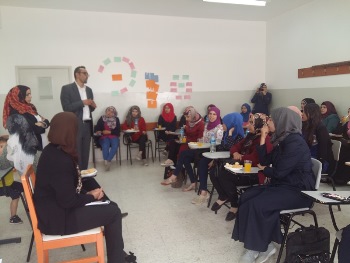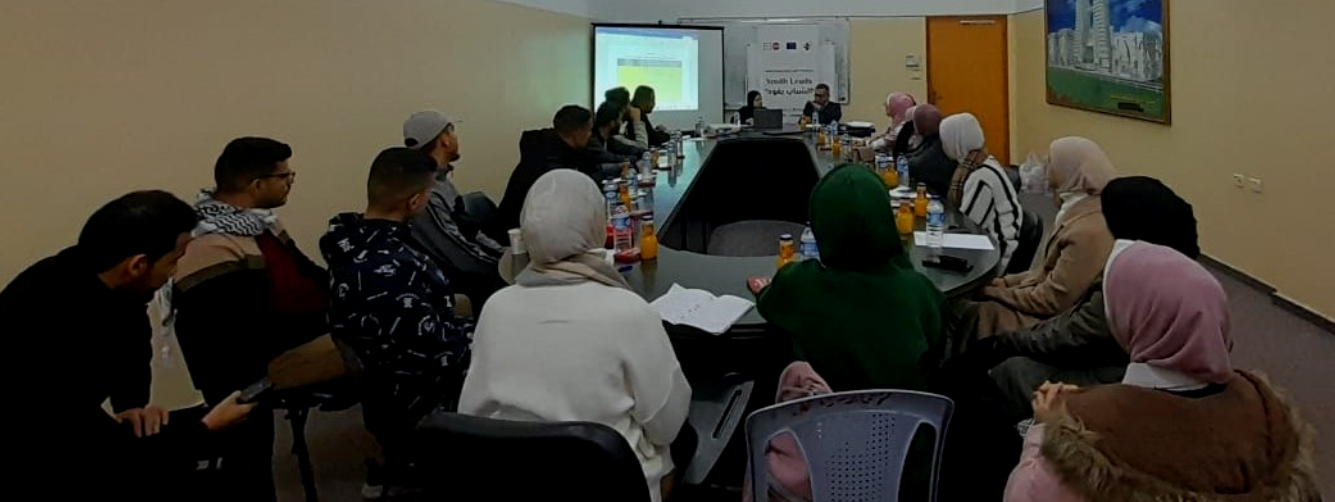
As part of the project “Supporting leadership roles in Local Government Units”, implemented in partnership with GIZ, MIFTAH recently targeted Palestinian university students, holding seminars in various Palestinian universities. This project is aimed at encouraging the political participation of women and influencing towards gender-responsive decision-making mechanisms in LGUs. The objective of the seminars, which were facilitated by MIFTAH field coordinators, was to encourage the students to participate in the democratic process and decision-making. During these sessions, women LGU members talked about their experiences in the election process and their role as women, including lessons learned. The seminars also entailed a presentation on the Local Council Elections Law and material pertaining to the candidacy age and electoral lists system, with the participation of the Central Election Committee in the following districts: Jenin, Bethlehem, Hebron, Jericho and the Jordan Valley, Ramallah, Jerusalem and Nablus.
Hebron University
At Hebron University, 185 students came to the meeting in which municipality members Jihad Ratrout from Samou’ Municipality and Abla Faroukh from Saeer presented. The women council members talked about the experience of Palestinian women in local council elections, stressing on the pioneer role which women could play if they are in decision-making positions. They talked about their experience and the challenges they faced and how this reflected on their aspirations to go through the experience again and to move into new posts and decision-making positions.
Furthermore, Hebron University President Dr. Salah Zaro stressed on the importance of such extracurricular activities, commending the role of MIFTAH and the departments of law and social sciences in this activity. Zaro pointed out that elections were one facet of democracy, which could not succeed without reinforcing the democratic principle of peaceful transfer of power.
President of the university’s law school, Mutaz Qafisheh talked about the philosophy of elections and presented a brief history of elections in Palestine. He also addressed the factors of success for any elections including the development of cultural and education levels, the economic situation and the agreement over the principle of the rule of law and peaceful transfer of power. He touched on the promotion of women and their participation in decision-making, overcoming blind patriarchal, tribal, factional and territorial thinking and the exploitation of religion in politics. He indicated to the need to understand the social-political context of elections in Palestine and the formulation of a conciliatory electoral system that guarantees that no one faction takes control of authority.
CEC director in Hebron, Hatem Sa’afin then spoke about the lists system and candidacy age in elections and gave a presentation on the experiences of certain counties and several legislative and municipal elections in Palestine.
Meanwhile, viewpoints varied on lowering the rate of candidacy; the participants called for lobbying and advocacy campaigns to lower the age of candidacy to 23, that is, after students have completed their university education and have therefore increased their experience in public life and social integration. They would hence be more able to network with youth and social leaders.
The participants also discussed the women’s quota. The majority of students insisted on raising the quota to 30%.
In regards to the elections system, disputes arose over this system. Some felt that the system protects the bigger factions in order to increase their representation. Others confirmed that the individual and lists system should be carried out in the next stage so that there is fairer distribution and encouragement for independents to run.
Al Quds University / Abu Dis
At Al Quds University/Abu Dis, students from various disciplines participated in the study circle along with two local council members, Arij Riziq from Beit Fourik council and Nasra Qabalani from the Bir Nabala town council. A total of 110 students and lectures were also in attendance.
The meeting included a discussion of women’s political participation with the aim of developing, prompting, raising awareness and educating university students and encouraging them to participate in the democratic and decision-making process. Based on this, a presentation was given on the experience of women members in the district in the elections both before and after the quota system was approved. They also spoke about the obstacles they faced during the elections or when appointed.
The students were mostly interactive on the subject of lowering the candidacy age for local council, legislative and presidential elections. 60% of them stressed on the importance of lowering the age of candidacy for presidential and legislative elections in order to allow the opportunity for youths to wage the political competition. A number of female participants also expressed their desire to run in elections after hearing the experiences of the council members.
Meanwhile, 70% of the students confirmed the importance of showcasing these experiences in universities, including the experiences of the female council members who were part of structural planning and infrastructure committees, tenders and economic committees and budget and projects committees. That is, their role should not be confined to women and children committees.
Al Najah University
At Al Najah University, the study circle was held in the mock court in coordination between the law school, public relations and the CEC, with 67 students in attendance. At the meeting were local council members Ahlam Khudeir from the town of Jamaeen and Zahira Asous from Bourin, along with Mahmoud Masimi, director of the CEC office in Nablus, Dr. Sana’ Sarghali from the law department and Afnan Sayed from public relations.
Dr. Sarghali confirmed to the students the importance of this seminar, saying it was an integral part of the study of constitutional law, pointing to its significance in their political lives and citizenry.
Mahmoud Masimi then gave a comprehensive presentation on the elections committee, the electoral lists system and the age of candidacy. He also presented on the experiences of other countries and several legislative and municipal election experiences in Palestine in addition to the voting process, election campaigns and monitoring.
Ahlam then spoke about her experience and the electoral lists system, which initially posed an obstacle to her candidacy. However, she maintained, her insistence on running in the elections forced the formation of a list in which she was included, adding that if there had been a constituency system, this would have made matters easier.
Municipal council member Zahira also shared her experience and talked about the importance of the women’s quota system in elections, especially in villages where women are not allowed to run in local council elections. She stressed on the pioneer role which women could play in decision-making positions.
In terms of the elections law and the proportional representation lists, the participants said the law was unfair against independents who wanted to run alone without being on factional or familial lists. This means the candidate must put additional effort into forming independent lists and must sometimes accept people for this reason alone.
The speakers recommended that pressure be put towards changing the law into constituencies or open lists, and demanding political parties to work towards training and raising awareness among youths so they could qualify to run.
The participants furthermore considered the women’s quota the easiest way for women to reach decision-making positions, but said it was necessary that active and qualified women were chosen for these slots. They also said efforts must be made to increase their representation in elections laws, noting that most factions signed this increase of women’s participation to 30%, while lists still maintain it at 20%.
Arab-American University in Jenin
MIFTAH’s Jenin coordinator Farha Abul Hayja’ said the seminar at the Arab-American University in Jenin targeted over 80 students who had no prior information or experience about elections. Hence, the speakers stressed on the need to raise awareness about elections and the participation of youth in these elections as candidates and voters. They said youth should not remain just numbers that graduate from universities without having any role in the change process.
The participants were in agreement over the need for serious efforts with youth. This includes involving them in wide-scale awareness processes in order to create a change in the significance of their role in political and social life where their role is not only limited to being university graduates without having any role in the change and development process in Palestinian society. They also recommended that a meeting is held with university administrations to discuss and pressure towards the possibility of introducing a course on political participation in the university syllabus.
Abul Hayja’ pointed out that the seminar encouraged the university administration to organize more similar seminars with the aim of raising the awareness of students and encouraging them to participate in more activities. She also said it motivated some students to participate in meetings outside the university to discuss the subject of candidacy age. They added that radio and television programs should be held in which youths who support the idea of participating in elections are hosted. Additionally, radio and television spots, they maintained, could focus on the importance of participating in the democratic process, on the elections law and the means by which registration and candidacy processes are conducted.
MIFTAH held other seminars in various Palestinian universities in Jericho, Tulkarm and Ramallah in which several active women council members participated. They also shared their experiences in the election process and the challenges they faced as decision-makers within their local councils. These seminars hosted groups of students to motivate them to become more involved in the elections, which are a clear example of the principle of peaceful transfer of power. Their role was also encouraged in terms of political participation, women especially, and in supporting women’s involvement in the decision-making process.








